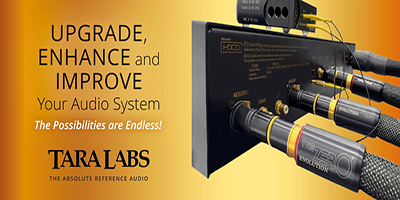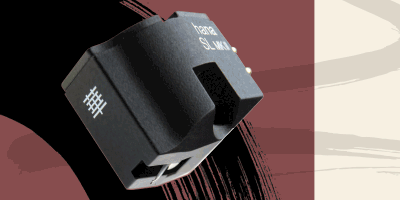Positive Feedback is first and foremost a community, composed of writers and creative persons from around the world. Positive Feedback is an ongoing "work in progress," chronicling the efforts of audiophile listeners, reviewers, designers, manufacturers, distributors, and humorists to explore the possibilities of high end audio to the utmost. Any audiophile with something worthwhile to say is welcome to contribute to Positive Feedback. No false and misleading barriers are put up against "manufacturers," nor do we assume that individuals commercially involved with high end audio are automatically suspect. Informed members of the design/manufacture/distribution community have been enthusiastic and supportive contributors to Positive Feedback from the beginning, with no messy controversies about "conflict of interest."
Indeed, given the open and voluntary nature of the artistic and editorial community here, with its self-monitored standards of excellence, there is little opportunity for real conflicts of interest. This does not mean that problems have not occurred—they have, on several occasions—but that we know how to deal with them. Our international editorial group numbers some 80 or so participants, all dedicated to the spirit and content of Positive Feedback. I would stack them up against any audiophile editorial "staff" in the world. I say that with confidence and enthusiasm, for the Positive Feedback community is a truly remarkable group!
The mission of Positive Feedback is straightforward in statement, complex and rich in execution: It is the mission of Positive Feedback to EDUCATE and ENTERTAIN its readers as to the possibilities of high end audio. In our vision, this is a comprehensive task. It includes everything from an appreciation of live music, through the recording/audio engineering chain (both analog and digital), through the storage medium, to the audio reproduction chain, out to and including the listening room and the mood/biases of the listener. The spiritual/metaphysical realms are not neglected, indeed, we consider the spiritual, cultural, and ethical dimensions of music to be some of the most important areas for discourse. We believe that our readers will get more out of their music as they learn more about what goes into it.
The world doesn't need another dry, stuffy, pretentious journal! There are LOTS of those around. We are dedicated to the proposition that high end audio should be fun, and should be filled with good spirits. We have found that humor is the most important ally of the audiophile, and ought to be more characteristic of the 'phile community. You will therefore find that satire, cartoons, humorous pieces, and witty surprises are common in Positive Feedback. Some people are put off by them, or are offended by the brash, the bizarre, or the satirical. Such people are not Positive Feedback readers, and are hereby directed to the audio publications that seem to be crafted just for them. (What else can I say?) For the rest of us, Positive Feedback fits rather nicely. Warning: We are widely eclectic, and very much interested in everything that we're interested in! In short, Positive Feedback is committed to quality, community, and collegiality. We will continue to pursue this commitment with any other person or publication of like mind. E pluribus unum....
Positive Feedback does not seek to be a consumer ombudsman or a consumer watchdog. Instead, we want to help our readers develop their own sensibilities and discernment by providing guides to quality and excellence throughout the audio chain.
For this reason, Positive Feedback is quite committed to the possibilities of "Do It Yourself" (DIY) projects, room treatments, construction projects, mods and tweaks for high-end systems, including power supplies. We see this as a major element in the re-invigoration of high-end audio.
Our Review Philosophy
First, the idea that a reviewer can insert a component into an audio system and discern its sonic value for universal applications is flawed for two reasons. The first is that a given component may or may not be compatible with the other components in the system. We feel strongly that it is impossible to review an isolated component, only an entire system. An audio component, in other words, is just that—a component of the bigger whole. Of course, aside from doing measurements, which we feel is of limited value, there is no way to evaluate an audio component other than by inserting it in a system. Nevertheless, having one reviewer evaluate a component, in one system, reveals only how it sounds in that system, and has limited universal application to the reader.
The second problem with the typical review procedure is that good sound means one thing to one listener and entirely something different to another. Some listeners value, say, timbral accuracy over other virtues, others may value detail, soundstaging, dynamic range, and so on. If a reviewer's priorities differ significantly from one's own, their evaluation of a component may not be particularly useful. Meaning that we all hear differently, have different biases and tastes, and well, so who speaks the truth? We determined that while we still had faith in the concept of subjective reviewing, there were ways to expand its utility.
First, we decided that each reviewer should, if possible, actually own the components used in his or her reference system, and that the item under consideration is the only new element in a group of components that has been carefully assembled to reflect the reviewer's tastes (this does not mean that the item under review has to owned by the review [though it can], just the system it is being reviewed with, though there are obvious exceptions—like articles that deal with a reviewer building a system or going through drastic changes in their system where component combinations are in flux. Or where more than one cable or such is there and they are doing a round-up of similar products.). And we know that there will be long-terms loans... so those are noted in our systems as bolded items... and since they are long term loans, they are a well known entity.
Musical systems don't happen by chance. It takes plenty of effort and time to find components that will perform together synergistically. Because we know how our systems sound, inserting, say, another preamplifier for our own, we can easily tell you what the differences are and of what value they are to us. Have a stable reference! Along with this, comparisons can also be made against products we are familiar with, but do not own. Meaning how does it stack up against other similar products I have had in my system? And, if the product doesn't work for us, we'll tell you why. Without lecturing or pompous posturing, we will simply report, as truthfully, fairly, and as succinctly as possible, our perceptions of its value and performance.
When we review equipment, we concentrate on gear and combinations of equipment that have something worthy to offer. All price ranges, and both new and used gear are within our purview. System synergy is seen as of supreme importance. Equipment that comes in for review is as carefully matched with other components and with the preferences and predilections of the reviewer as possible. During the review period, writers are actively encouraged to discuss their progress (or lack of same) with the designer/manufacturer. Designers are also invited to write sidebars or accompanying articles describing the creative process of their work. We believe this furthers our mission, and will continue to work for this harmonious synergy with the creative community that produces quality equipment.
If we work hard, but cannot find the "magic," then the gear is returned without review. Read the above—if it does not fit into what we are after, fails in system synergy, or is simply not happening, we are not going to spend our time on it. This has happened on a number of occasions. It does not mean that the equipment is "bad," simply that we could not find a combination that did anything for us. Other settings might well yield excellent results. We wish to tell our readers where the gold is, not where it ain't. Those seeking "trash 'em, gut 'em" reviews will find several other high end journals to be more helpful. We believe that our procedures provide a much wider perspective of a component's performance and characteristics.
Ethical Principles and Guidelines for Members of the Positive Feedback Community
(AKA "The BIG TEN"!)
Originally written in 1997; revised May 15, 2015 by Dr. David W. Robinson
To make sure that we all understand some fundamental principles that govern the work that we do at Positive Feedback, the editors present the following points. Please make sure that you as an editor/reviewer/contributor conduct yourself accordingly, as you may assume that we will be mightily perplexed if you do not...
Number 1: No hardware review project is to be initiated without first checking with either Dave Clark or I, or our designated hardware editor. Without exception.
This means ESPECIALLY that you should NOT contact a designer/manufacturer for review sample(s) unless you have our authorization to do so. Other members of the PF editorial group may already be working with the product/company, or I might consider the product/company to have sufficient exposure already, or there may even be a (God help us) political factor or three that you should be aware of before making contact with a designer or manufacturer. Who knows? I might even have a better idea or project for you...
There are also questions of logistics (those 1200 pound speakers might be better reviewed by your PF brother or sister of equal qualification who happens to live 2000 miles closer to the manufacturer, or we might want to ship it to you, then to someone else); the possibility of assembling a review panel in limited instances; questions of liability, insurance, and costs to be properly covered with the manufacturer; the need (in some cases) to direct designers/manufacturers to our National Advertising Manager for rate cards, ad contracts, etc.
In other words, do NOT "wing it" and get back to us later, amigos. Period.
Number 2: No music review project or requests to be placed on "free review sample" lists shall be attempted without notifying both Dave Clark and I.
There are plenty enough "music reviewers" in the sweaty world of proliferating 'phile publications as it is; frankly, I wonder that more of the small audiophile labels don't just wither away and die just based on the freebies that they're handing out to an ever-increasing number of "reviewers." I don't propose that PF add to the problem. If you are quite sure that you are called to review music, then all you have to do is impress Dave or me, and we'll do what we can for you.
Which is not a guarantee, by the way; just a statement that we'll try to help you get some samples your way.
By the way: Both Dave and I are busy hombres. If we don't get things done quickly enough for you, by all means be persistent—but don't be a pest. If a label isn't responsive, if you aren't getting your LP/SACD fix, well, you might just have to go out and BUY them.
No one ever said this audiophile review thing was easy.
Number 3: Art is 10% inspiration, 90% perspiration.
Which means that I expect that writers will WRITE, reviewers will REVIEW, photographers will PHOTOGRAPH, artists will ART, and editors will-well, you get the picture. Don't just hang around the masthead, basking in the glow-have at it! That's not to say that you have to do something for every issue (far from it), but rather that if you have a "go" on a project, GET IT DONE. If you say you'll do it, then do it.
Dilettantes 'n dead wood will not stay on the PF masthead. Hope that's not you.
Number 4: Respect the deadlines.
Old pros: take note!
And all will be edited to a high standard as defined by the Editors.
Number 5: All "accommodation pricing" transactions involving review gear are to be cleared by either yours truly or Dave Clark, personally. NO EQUIPMENT IS TO BE PURCHASED VIA "ACCOMMODATION TO POSITIVE FEEDBACK WRITERS/EDITORS" WITHOUT EITHER DAVE CLARK'S OR MY EXPRESS APPROVAL.
The reason for this is quite simple: It is far too easy for misunderstandings or allegations of improprieties to get out of hand unless I oversee such transactions. There is nothing wrong with accommodation to legitimate members of the audiophile press, provided that sufficient oversight is in place, and provided that safeguards against wrongdoing are active and effective. Both you and the magazine must be protected against the kind of nonsense/corruption that has occurred from time to time in the industry; let us help you in this.
By the way: NEVER, NEVER attempt to negotiate an even more favorable price for accommodation equipment by "shopping" accommodation prices around. E.g., "Say, Fred, that's a good deal that you offered me, but as an OFFICIAL PF REVIEWER I can get it at 50% off. Can you beat that price for me??!!"
This, believe it or not, actually happened with one Positive Feedback reviewer. The manufacturer's US representative still will not talk with us—ten years later—and the reviewer was immediately outcast from PF forever by yours truly.
The reviewer couldn't believe that I would do this—didn't think that he had done anything really wrong.
Wrong!
We also note that the standard "one year rule" applies to all review equipment that is purchased by PF editors/reviewers/contributors:Any accommodation purchases must not be re-sold for a period of at least one year, without exception. Such equipment must not be re-sold for more than the accommodation price. Any attempt to hide such sales via the use of a pseudonym or "handle" on the Internet or a second party/proxy sale will be treated as a violation of this policy, and will lead to your termination from PF.
A final note: Don't be a gear junkie or a pest.
Number 6: THERE ARE NO QUID PRO QUO'S OF FAVORABLE REVIEWS IN EXCHANGE FOR ANY CONSIDERATION AT POSITIVE FEEDBACK .
You will NOT promise a favorable review in exchange for anything. Ever.
You do, and you're gone; it'll be my boot chasing your hindmost parts out the door.
Number 7: Be as timely as possible in reviewing and returning equipment—and NEVER GET INTO ARGUMENTS WITH DESIGNERS, MANUFACTURERS, DEALERS, OR DISTRIBUTORS.
Dave and I both know how hard it can be to stay on track with review projects, but we ask that you work very hard to get equipment back to the supplier as expeditiously as possible. If there is to be a long-term review project, let Dave or I know this, so that we are aware of what you're doing. This will protect PF from gaining a reputation for hanging onto everything longer than necessary.
As to the "no arguments" rule… nothing can poison reputation/working relationships faster than getting into a slugfest with a supplier. Reviewers/contributors are not to do this, ever. If you are having a problem with a source, then contact either Dave or me, so that we can help to resolve the issue authoritatively.
We definitely do NOT want to be called in after the fact… mopping up after hostile/irresponsible contributors have done the damage is not going to be appreciated by your editors.
Nor tolerated.
Number 8: Do not take the name of the magazine in vain.
This includes indiscretions on the Internet.
We're all free agents, of course, and this is not intended to stifle or inhibit personal expression or opinion, of which we all have tons and tons. It's just a reminder not to involve PF as a battering ram, wedge, shield, shiv, or nuke during some personal crusade. I have had writers try this as well…the ones who did are no longer with us.
We have all worked too hard to establish the good reputation of PF... don't get in the way of our efforts, please.
Number 9: Be careful what you say publicly about others.
If your name is in print, as it is at PF, your opinions and comments about others can cause some real shock waves. There are plenty of times when PF is going to cause necessary controversy, slaughter some sacred cows, and shovel shit out of the Stygian Stables. Don't squander our larger mission with tantrums or personal outbursts, and don't be too quick to take offense.
I've probably been insulted and attacked more than any of you in my tenure at PF, I do believe; I don't allow it to bother me, and pay no attention to the (often humorous!) wrath of others. Fine audio is full of this sort of thing, it seems; get used to it, look for the humor in it all, and try to find real friends. That's what this is all about.
Number 10: When in doubt—about anything—call or email your editors.
That's what Dave Clark and I are here for.




























